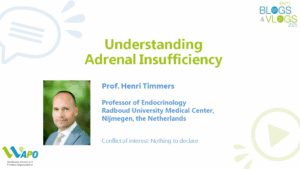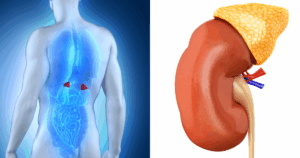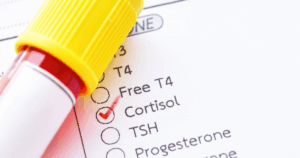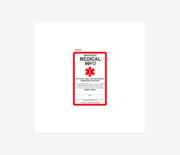2025 Blog 5 – Understanding Adrenal Insufficiency
We are happy to present a new edition of the 2025 WAPO Blogs and Vlogs series featuring Professor Henri Timmers. Prof. Timmers is a professor of endocrinology at the Radboud University Medical Center in Nijmegen in the Netherlands. He is equally Chair of the Radboud Center of Expertise for Adrenal Disorders, and has been kind enough to provide an overview of the causes, symptoms, treatments, and common misconceptions surrounding adrenal insufficiency.
This article provides a summary of the Vlog interview that you can find in English and Spanish on the WAPO website’s Library and YouTube channel.

What is adrenal insufficiency and how does it affect the body?
Prof. Timmers started by explaining that the adrenal glands are small structures located on top of each kidney. These glands produce cortisol and several other hormones (such as aldosterone and epinephrine) essential for the body’s response to stress, as well as for maintaining blood pressure and blood glucose levels. When adrenal insufficiency occurs, the glands can no longer function properly and hormone production drops. In severe cases, this can lead to a complete shutdown of the body.
He went on to outline the different forms of adrenal insufficiency, which depend on the organ involved. There are three types of adrenal insufficiency:
- Primary adrenal insufficiency (PAI), which occurs when the adrenal glands themselves are damaged and fail to produce hormones. When the origin of this damage is autoimmune in nature, it is referred to as Addison’s disease.
- Secondary adrenal insufficiency (SAI), which occurs when the issue lies in the pituitary gland, the small hormone-producing gland located beneath the brain that stimulates the adrenals.
- Tertiary adrenal insufficiency (TAI), which occurs when there is a problem with the hypothalamus (a decreased amount of corticotrophin-releasing hormone (CRH) is released from the hypothalamus, resulting in the suppression of the hypothalamic–pituitary-adrenal axis) and is often due to long-term use of steroids.
Together, these three levels form the hierarchy that regulates the function of the adrenal glands.

What are the early signs or symptoms of adrenal insufficiency and how is it diagnosed?
Prof. Timmers stated that in patients with adrenal insufficiency, the body lacks adrenal hormones such as cortisol, a glucocorticoid (and in some cases, mineralocorticoids and androgens). This deficiency in adrenal hormones can lead to a wide range of flu-like symptoms. These may include fatigue, muscle aches, headache, weight loss, nausea, and vomiting.
Adrenal insufficiency is diagnosed by measuring cortisol and other hormone levels in the blood. This is ideally done early in the morning, when cortisol naturally reaches its highest peak. He noted that cortisol levels normally decline during the day and become very low during the night when you are sleeping. Prof. Timmers added that, in some cases, blood tests alone are not enough to diagnose adrenal insufficiency, and a stimulation test may be required. This can be done using adrenocorticotropic hormone (ACTH), the pituitary hormone that stimulates the adrenal glands, or, in some cases, insulin or an agent called metyrapone may be used. He explained that clinicians look at how much cortisol increases in response to these stimuli, which helps detect milder or less obvious forms of adrenal insufficiency.

What are the treatments for adrenal insufficiency and what should patients be aware of?
Prof. Timmers explained that under normal circumstances, the adrenal glands produce a fixed amount of cortisol each day. For people with adrenal insufficiency, this can usually be replaced with cortisol replacement therapy. Most often, this takes the form of hydrocortisone or another steroid. For some patients, a single morning dose is enough, while others may require up to three or four doses. However, most people take two doses per day, with the largest dose taken in the morning to mimic the natural diurnal rhythm of cortisol, which peaks early and gradually declines throughout the day.
He went on to describe that under certain circumstances, such as when experiencing fever, flu, illness, pain, or any type of physical or emotional stress, the body normally produces extra cortisol. Because patients with adrenal insufficiency rely entirely on oral hydrocortisone, it becomes essential to increase the dose during these moments of stress. This may mean doubling or even tripling the usual dose to meet the body’s increased needs. This approach is known as stress dosing, and the guidelines for this are often referred to as “sick day rules”. These measures are crucial to prevent an adrenal crisis, which is a potentially life-threatening medical emergency where the body shuts down due to dangerously low levels of adrenal hormones. Once the stressful situation is over, patients can first taper the dose within a few days and then return to their regular daily doses of glucocorticoids.
Prof. Timmers added that if a person is unable to take oral hydrocortisone, due to vomiting or diarrhea, for example, it becomes vital to administer hydrocortisone through an intramuscular injection, either by the patient themselves or by a family member, friend or caregiver. This ensures that the body still receives the steroids it needs to cope with the stress. Prof. Timmers added that in certain situations, a visit to the emergency room and hospital admission may be necessary to receive the correct dosing and to stabilize the patient.
In addition, some patients may also be required to take fludrocortisone, to replace a mineralocorticoid hormone called aldosterone (which is decreased in PAI), and dehydroepiandrosterone (DHEA), to replace androgens, if necessary.
What are the main misconceptions about adrenal insufficiency in the medical community?
Prof. Timmers shared that there are still many misconceptions about how the adrenal glands function and this misinformation can sometimes be found circulating on websites and on social media.
Prof. Timmers highlighted the example of the term “adrenal fatigue”, which is sometimes confused with adrenal insufficiency. He clarified that adrenal insufficiency is a real medical condition in which the adrenal glands no longer function properly. In contrast, adrenal fatigue is not a medical term. It is a concept suggesting that the adrenal glands become “drained” or “worn out” due to chronic stress, such as from a demanding job, family issues, or other ongoing pressures.The idea is that stress wears out the adrenal glands, but this is very different from adrenal insufficiency.
In fact, people labeled as having “adrenal fatigue” usually have high cortisol levels, not low ones. Prof. Timmers emphasized that the issue is not a shortage of adrenal hormones, and that the proposed solution often seen online, of taking extra steroids, is not only incorrect but can be potentially dangerous. He cautioned that taking extra steroids when not necessary, can actually be harmful, lead to side effects, and should be avoided. He concluded by saying that adrenal fatigue is a lay term, not a medical diagnosis, and should not be used interchangeably with adrenal insufficiency.

How does adrenal insufficiency affect the daily lives of patients and their caregivers?
Prof. Timmers began by saying that while adrenal insufficiency is a chronic disease, most of the patients he sees have a good quality of life and this is common in the majority of cases. At the same time, adrenal insufficiency is a lifelong disease that requires constant awareness.He explained that both patients and their caregivers must remain aware of situations that cause increased physical or emotional stress, as during these times it becomes essential to increase the dose of hydrocortisone to prevent adrenal crisis. Being prepared for these moments is crucial and is something that patients and their families think about all the time, which can have an impact on their mental health.
Prof. Timmers added that hormone supplementation generally does a good job compensating for the adrenal glands’ reduced ability to produce hormones. Hydrocortisone replacement helps overcome this shortage, yet he cautioned that it is impossible to fully replicate the body’s natural cortisol rhythm. Because of this, some patients may still experience ongoing symptoms, such as chronic fatigue and muscle weakness, which can have a significant impact on their daily lives.
What advice would you give to patients for managing their adrenal insufficiency?
Prof. Timmers emphasized the importance of being well informed when living with adrenal insufficiency, either as a patient or when you are a family member, friend of caregiver to someone with this condition. He stressed that self-education plays a central role and that joining a support group or a patient organization can be highly beneficial. Patients can find information and connect with others who share the same disease and can clearly explain its impact on daily life. They can also find a valuable network of support.
The top tips for managing adrenal insufficiency include the following:
- Patients should be thoroughly instructed on how to prevent and manage an adrenal crisis, including understanding the sick day rules and knowing when and how to increase their hydrocortisone doses.
- It is essential that patients learn how to self-administer hydrocortisone emergency injections, in case of adrenal crisis.
- Patients are advised to carry an emergency card or wear a medical alert bracelet, as these tools allow first responders to immediately recognize the condition and provide appropriate stress-doses of hydrocortisone.
Finally, Prof. Timmers highlighted the importance of having regular follow-up at a specialized centre of expertise for adrenal insufficiency, such as the Radboud Center of Expertise for Adrenal Disorders in Nijmegen in the Netherlands. Receiving care from a multidisciplinary team of experts can make all the difference in ensuring the best possible outcomes for patients.
We would like to thank Prof. Timmers for taking the time to share his knowledge about adrenal insufficiency with us. For more information about this condition you can visit the WAPO website’s adrenal insufficiency page as well as the additional resources below.

Additional Resources:
Adrenals.eu (international website with information on adrenal diseases)
2024 Walk with WAPO Awareness poster on Adrenal Insufficiency
Beuschlein F, Else T, Bancos I, Hahner S, Hamidi O, van Hulsteijn L, Husebye ES, Karavitaki N, Prete A, Vaidya A, Yedinak C, Dekkers OM. European Society of Endocrinology and Endocrine Society Joint Clinical Guideline: Diagnosis and Therapy of Glucocorticoid-induced Adrenal Insufficiency. J Clin Endocrinol Metab. 2024 Jun 17;109(7):1657-1683. doi: 10.1210/clinem/dgae250. PMID: 38724043; PMCID: PMC11180513.
Davies K. Understanding tertiary adrenal insufficiency. J PediatrNurs. 2023 Mar-Apr;69:121-122. doi: 10.1016/j.pedn.2023.02.012. PMID: 37061253.
Gruber LM, Bancos I. Secondary Adrenal Insufficiency: Recent Updates and New Directions for Diagnosis and Management. EndocrPract. 2022 Jan;28(1):110-117. doi: 10.1016/j.eprac.2021.09.011. Epub 2021 Oct 2. PMID: 34610473.
Huecker MR, Bhutta BS, Dominique E. Adrenal Insufficiency. 2023 Aug 17. In: StatPearls [Internet]. Treasure Island (FL): StatPearls Publishing; 2025 Jan–. PMID: 28722862.
Martin-Grace J, Dineen R, Sherlock M, Thompson CJ. Adrenal insufficiency: Physiology, clinical presentation and diagnostic challenges. Clin Chim Acta. 2020 Jun;505:78-91. doi: 10.1016/j.cca.2020.01.029. Epub 2020 Feb 7. PMID: 32035851.







